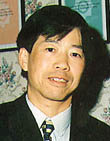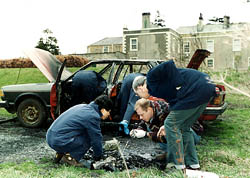



















| A POLICE expert who
has helped solve dozens of crimes in Hong Kong has become the first overseas student to
win a prestigious award from Britain's forensic science training school Ал and one of three
forensic specialists to be awarded honours after completing courses at the training centre
last year.
Mak Chung-hung, a scientific evidence officer in the Hong Kong Government laboratory in Kowloon, was presented with the Midland Bank Award, given to the outstanding student on the development scenes of crime course at the County Durham-based National Training Centre for Scientific Support to Crime Investigation in the UK. Hundreds of overseas students have studied at the centre over the years but Mr Mak is the first to win one of its three annual awards. He has been a forensic officer since 1974, and has been in his present post since 1992. |
 Mak Chung-hung, a scientific evidence officer in the Hong Kong Government laboratory |
|
His career has encompassed numerous murder investigations, including one case in 1995 when the sole available evidence initially was a pair of human legs which had been severed from a woman's body, stuffed into a sports bag and dumped at a refuse collection centre. After detailed enquiries it was established the legs were those of a 36-year-old restaurant waitress. Her body had been dismembered with a chopper and disposed of so effectively that no other parts were ever discovered. However, the evidence revealed by Mak Chung-hung's forensic examination led directly to a 32-year-old man, who worked in the same restaurant as the woman, being arrested. Fibres found by Mr Mak on the legs matched those on the clothing of the suspect, the deceased's wristwatch and gold ring were found on the man's bunkbed, and fresh blood splashes were found on his furniture and floor which matched the blood group of the victim. "The first time I ever attended a crime scene involving a dead body, I felt very uneasy, almost sick Ал I hate the smell," admits Mak Chung-hung. "But because the smallest piece of evidence discovered at the scene of a crime or on a body may be crucial Ал the only proof to link the culprit to the crime Ал I realised the importance of a scientific evidence officer's job and overcame my initial negative reaction in order to concentrate on the search. "Although I have to admit that I will never feel comfortable when dealing with a crime involving a dead baby or child. You never lose the sense that it is a great shame and tragedy because they are so young and innocent." Mr Mak, who has a degree in industrial chemistry from Hong Kong Polytechnic Institute and is a member of the Institute of Science and Technology in the UK, worked for years as a chemical technologist in the Government forensic science laboratory before deciding to focus his skills on frontline work that involves collecting evidence at crime scenes. | |
 C H Mak with instructors during an exercise at the County Durham National Training Centre for Scientific Support to Crime Investigation examining the burned remains of a document after a car bomb explosion to determine the owner of the vehicle |
In police investigations involving death, as a scientific evidence officer Mr Mak accompanies the forensic pathologist, who determines how the person died, to the scene. "My job is to provide an impartial service to the police by collecting every tiny piece of evidence of contact with the deceased - and also to determine evidence of a third person's presence (in addition to family members). What we supply is important because evidence collection at the crime scene links up the continuity of events of a crime - the chain of evidence is extremely important." For major crimes, scientific evidence officers keep in contact with the police through the whole procedure of arrest, trial, conviction, and on request give evidence during in court about what was found at the crime scene. |
|
Not all scientific evidence gathering deals with dead bodies. "In one case, the police wanted to know if a screwdriver found in a suspect's car was the same tool that was used to pry open several car doors in a robbery case," recalls Mr Mak. "I examined the damage done to the car door locks and proved that the screwdriver was not the tool involved and the suspect was released. So the job of the scientific evidence officer is not only to link up the criminal with the crime through discovered evidence, but contrarily, our evidence can be used to exonerate a suspect who is innocent and disprove the presence of a suspect at a crime scene." According to Mak Chung-hung, his six-member unit of laboratory specialist services officers handle about 500 cases a year. When necessary, the police officer in charge of a criminal investigation contacts the unit's crime scene manager who then sends one of the scientific evidence officers to the crime scene. "Basically, we're on 24-hour call," shrugs Mak Chung-hung, who spends his leisure time with his wife and young son, or playing mahjong. "Even on my time off, I'm still on call Ал which happens more than 50 per cent of the time, because crime never stops. So, I've had to limit the mahjong because my fellow players don't like me getting up and leaving in the middle of a game. My job is demanding, and some sacrifices have to be made, but in return I get job satisfaction when my work helps to convict a culprit." | |
| |
|
HAVE you ever been asked to fill in a form
full of irrelevant detail? There is now an important weapon against such malpractice Ал the
Personal Data (Privacy) Ordinance.
In accordance with Principle (1) of the Ordinance, personal data can only be collected and used for the purpose stated on the form and it must be necessary for, or directly related to this purpose. Data collected cannot be excessive in relation to the original purpose of collection. Often when filling in a form, much of the detail which you consider irrelevant is actually being used for marketing purposes. You have rights here too. Under Principles (1) and (3) of the ordinance, such data collected cannot be used without your consent unless you approve of the purpose it was collected. You must also be told whether it is voluntary or obligatory to supply the information. In addition, under Principle (2) of the Ordinance, personal data cannot be kept longer than is necessary "for the fulfilment of the purpose" for which the data was originally collected. Under Principle (4) of the Ordinance "data users" (the person or organisation holding the data) must ensure that personal data is protected against unauthorised or accidental access and that measures are taken for ensuring the integrity, prudence and competence of persons having legitimate access to the data. If you suspect that anyone is holding your data without authority, or they are using it for another purpose, or you just want to find out if there is a record under your name, under Principles (5) and (6) you can apply to see the relevant records. Data users are required to ensure that a person can ascertain a data user's policies and practices and the procedure for making inquiries about their personal data. If you are not satisfied with the response, or with the data user's policies, you can complain to the Data Privacy Commissioner. Under Section 58 of the Ordinance, the Police Force has broad exemptions from Principles (1), (3) and (6) for the purposes of the prevention and detection of crime, the apprehension, prosecution and detention of offenders as well as in a number of more specialised areas. Guidelines on interpretation are issued by Police Headquarters on a regular basis, but it is important that you become familiar with the six principles which form the basis of the Ordinance so that, in the absence of any guideline on a particular aspect, you can make a common sense judgement should the need arise. It should also be borne in mind that you may often collect personal data from members of the public for which you have no exemption under Section 58. For instance, if a member of the public approaches you and hands you a wallet which he or she found on the ground would you (as a police officer) demand to see his or her identity card? Why? Do you suspect that this person was the original thief? Why would a thief bother to return the wallet to a police officer? It appears you would have very thin grounds for requiring this information. How about if the finder wanted to claim a reward if any? In that case you would be justified in writing down the finder's name and address - but only if he/she agreed and you informed the finder of the purpose of collection. So let's say the owner wants to give the finder a reward ? can you release the finder's name and address to the owner? Yes, but only if the finder agreed. If the finder wants the reward but does not agree to release of the information to the owner then it is not up to police to help. It is not a police function to act as an intermediary in such cases. Such are the complications introduced by the Ordinance, but the rules have been designed to protect the ordinary person from arbitrary collection of information, and police must abide by the rules like everyone else. For police officers, if you feel there is any procedure or form which requires review as a result of this Ordinance or if you have inquiries, call CIP FD & AIC on 2860-3759. (Members of the public should direct inquiries to their local police station). |

